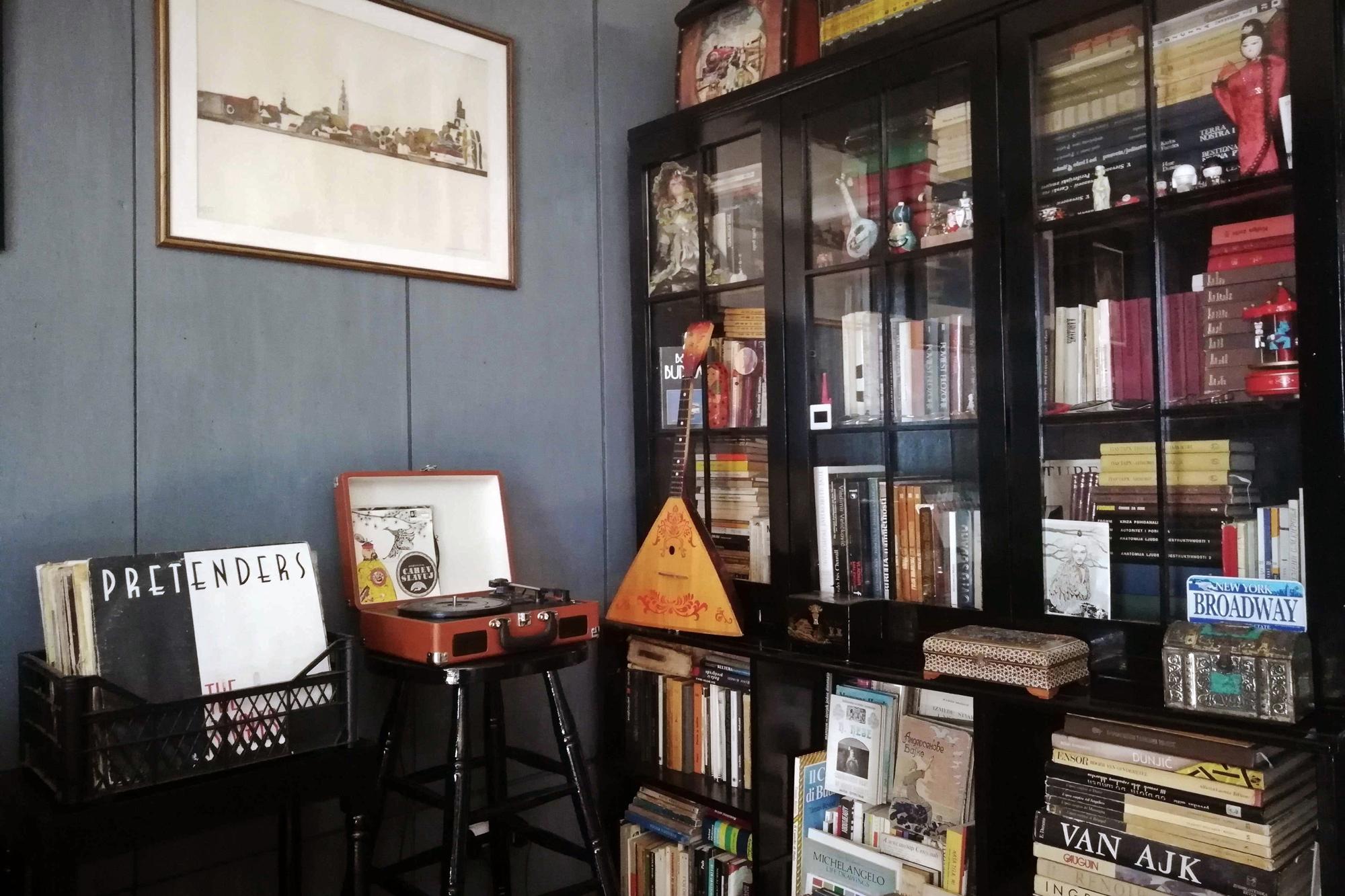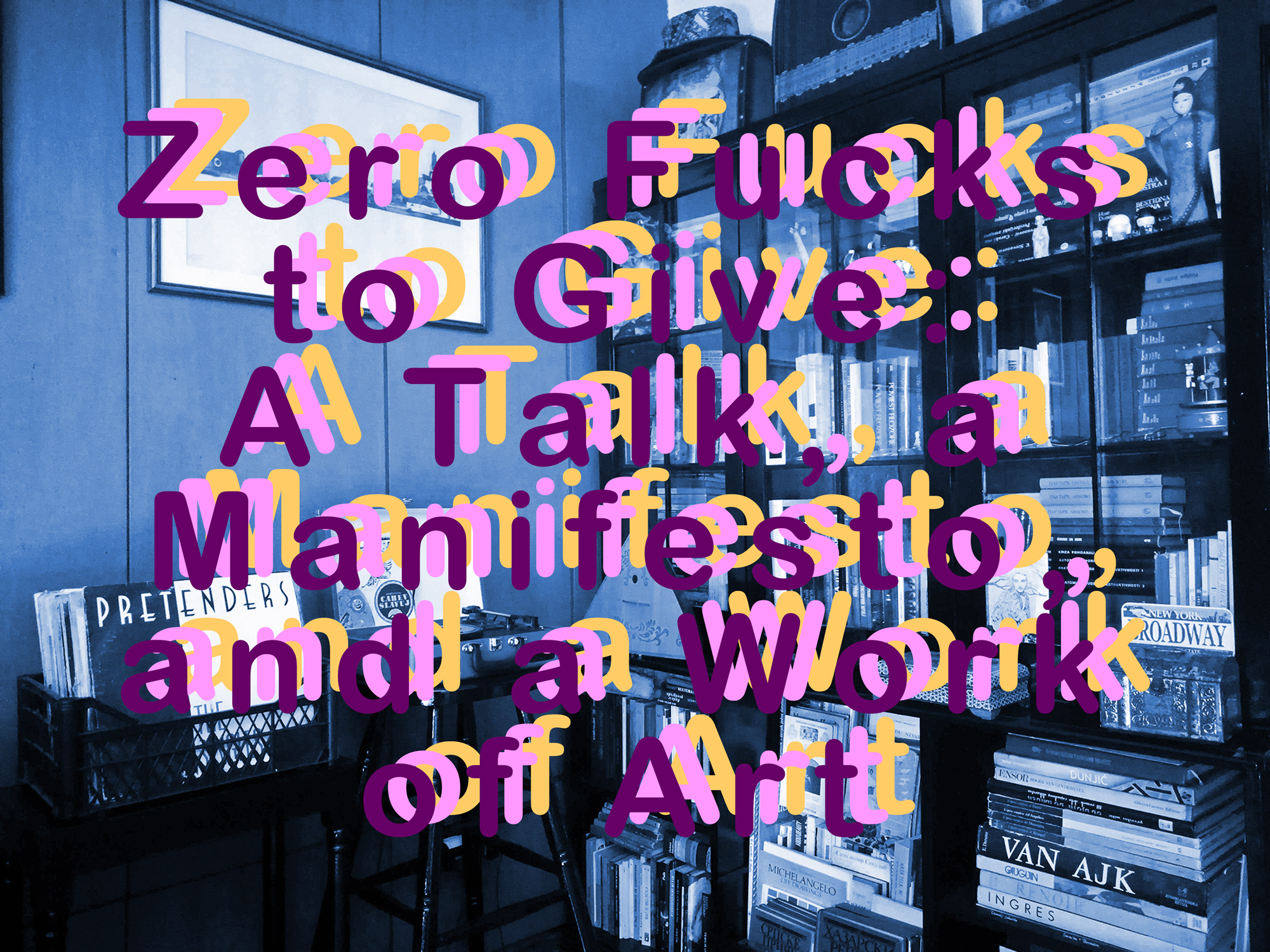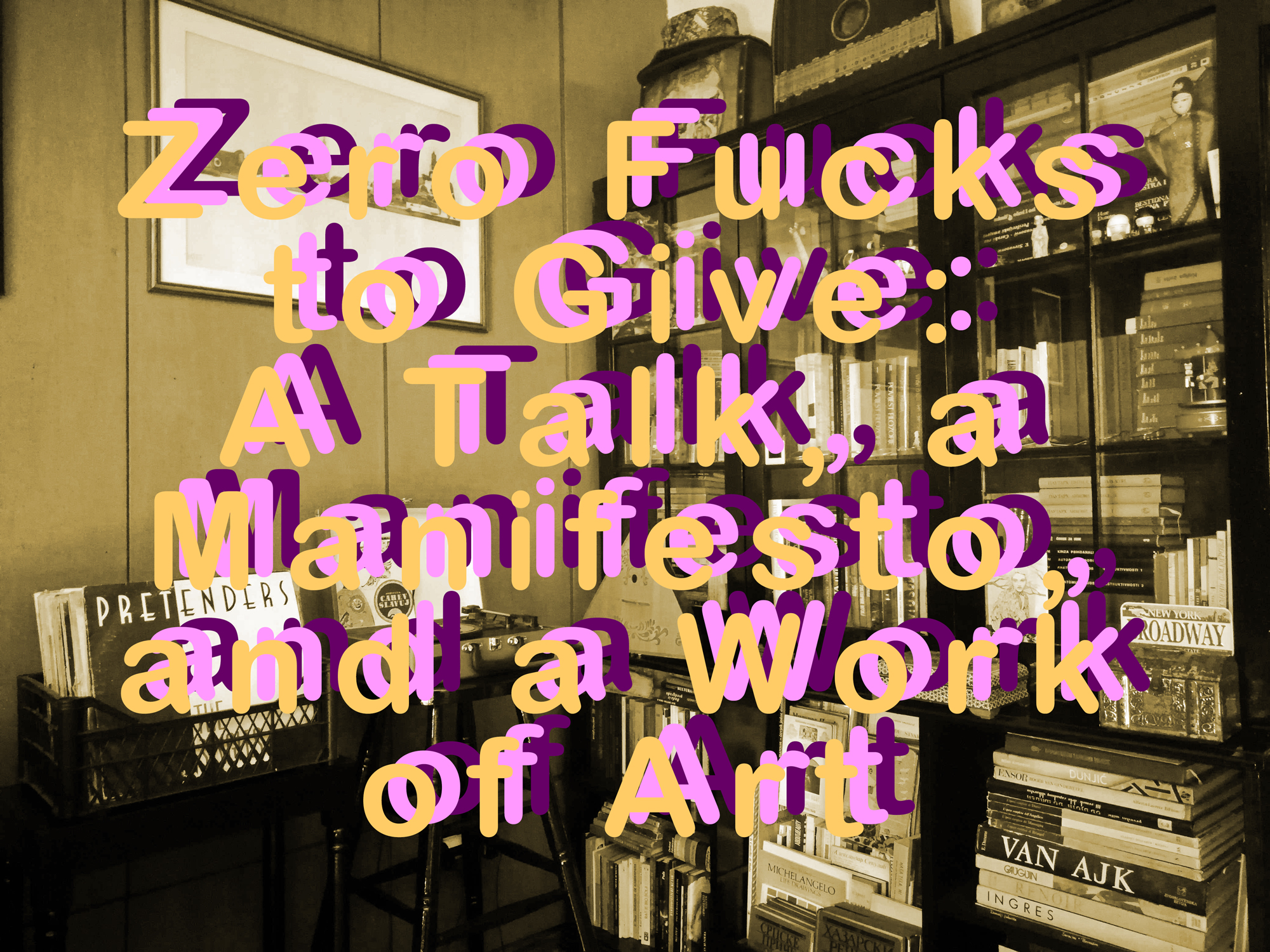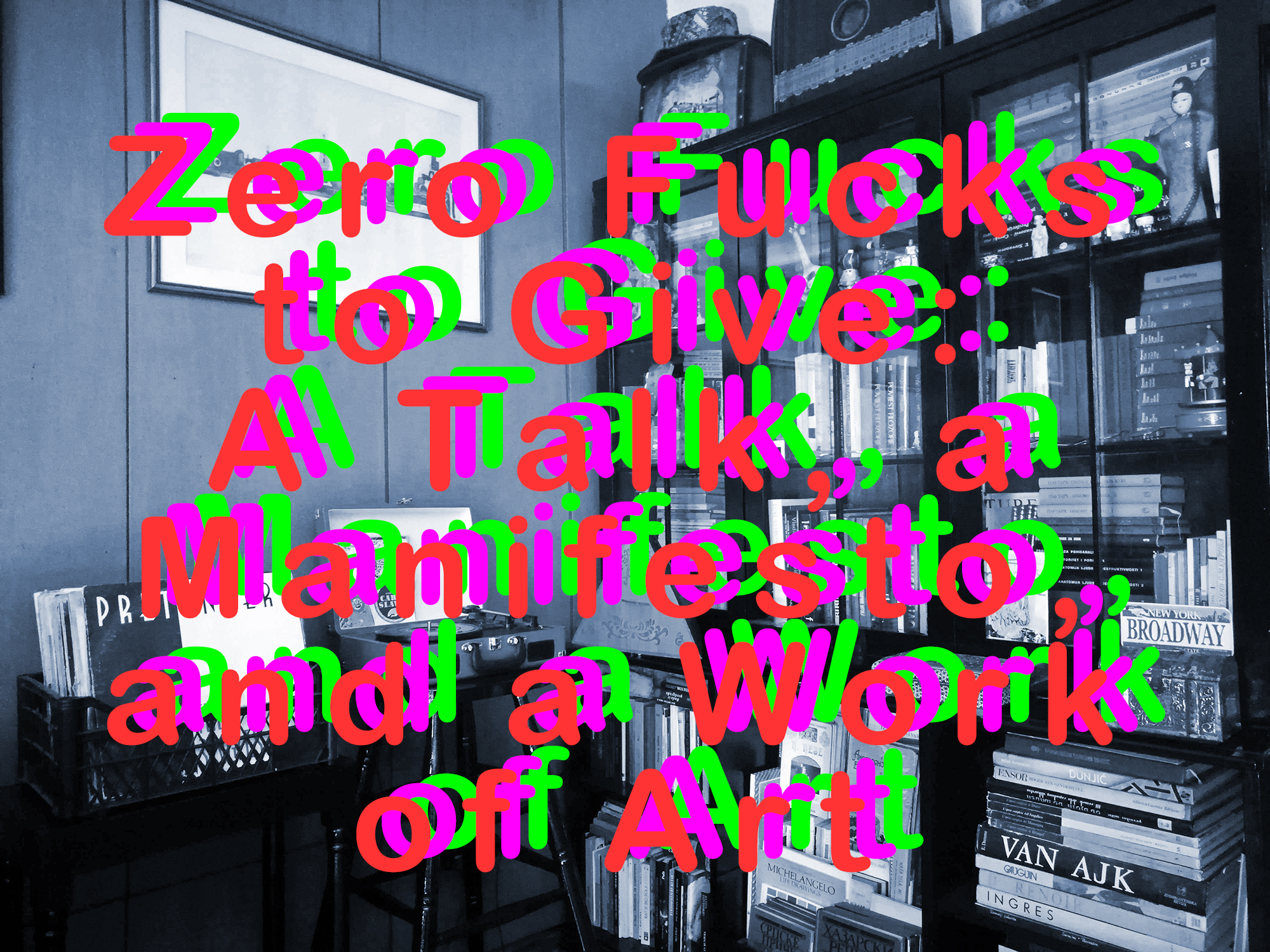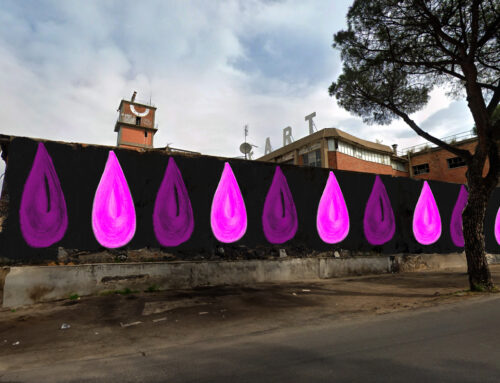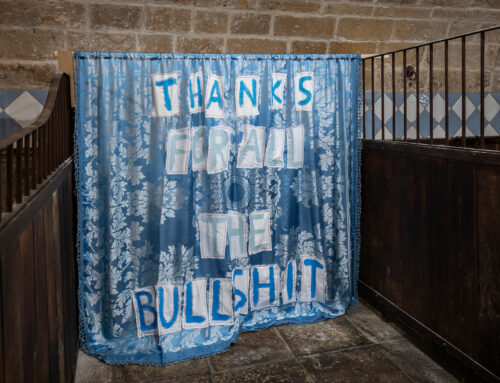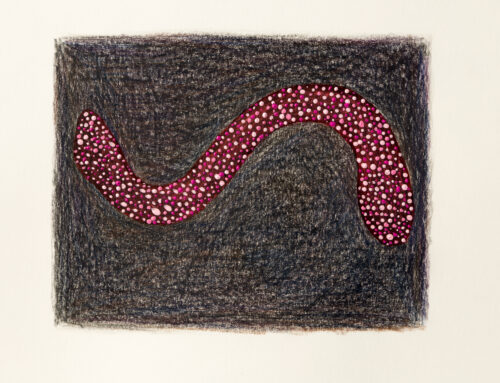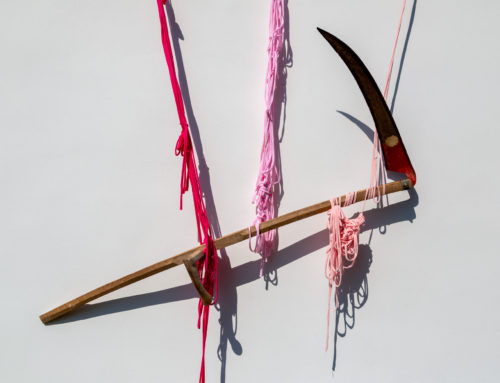Project Description
“ONE WORLD APPROVED THY WISDOM; ANOTHER, MINE.”
ANTIGONE, SOPHOCLES
Zero Fucks to Give is a work of art for Platforms Project, Athens, Greece, May 14-31, 2020 and is curated by Artemis Potamianou. It consists of a talk, a manifesto, and a video performance. It is part of a larger set of artworks started in 2017 with the same title to be released by the artist in 2020/2022. Zero Fucks to Give: A Talk, a Manifesto, and a Work of Art revolves around the concept of personal freedom, right and wrong, and one’s standing within society. It explores aesthetic issues as well as the conditions within which artists and curators operate in the 2020’s.
This particular work of art, together with the series that it belongs to, encapsulates the reactions of those who have been socially distanced for a long time already. Distances within society have never been the same for everybody—forms of social distancing, seclusion, exclusion, and segregation have always existed and have become only too visibile in the past twenty years. The works of art face up to the hypocrisy of contemporary discourses and the idiotic aesthetic responses to the structures of social exploitation of contemporary advanced capitalism. This is a form of capitalism which announces its concern and willingness to show a more humane face only to revert back the policies of ‘society first’ as soon as they are no longer necessary to protect itself. Then, and only then—once out of danger—this capitalism reverts to long historical policies, never abandoned, of culling the masses. This last piroette happens when the danger is truly circumscribed to those who do not count or have ‘no relevance’ within society.
Therefore, the artist continues his exploration of themes related to social upheaval, labor exploitation, crises, racial and gender discrimination, political and economic failures, populism, anger, and violence—the apocalypse in a few words—not because of temporary fashionable fads, but because he has always been concerned with social inequality.
The video work, curated by Artemis Potamianou, announces an artwork within an artwork. Simultaneously to Zero Fucks to Give, Aceti announces a new body of work entitled Trans-Mutations. These new artworks consist of the artist shedding his physical form and becoming embodied for a biennium in someone else: a young Serbian artist, Dea Džanković. She is the performer and artist that Aceti has chosen to embody him in Zero Fucks to Give and to be the first body occupied for the first biennium of Trans-Mutations.
“The themes of the videos, layered through the complexity of recent events, bring the viewer through a journey that constantly challenges perceptions and established stereotypes,” said Artemis Potamianou, explaining the spectacle of truth as absurd reality realized by Aceti through what appears a simple video-talk format. She also added that “the work of art absurdly reveals the hypocrisy of our contemporary societies and at the same time offers a challenging view on the roles that we all play in the simulacral construction of art representation.”
The full text is below. Enjoy it.
Zero Fucks To Give: A Talk, A Manifesto, and a Work of Art
Hello everyone, I am Lanfranco Aceti. This is my talk, Zero Fucks To Give. For those of you who actually know Lanfranco, well… I am not exactly him. I am the body, and mind, impersonating him.
The artist wanted to transform and exist as a young, rather beautiful, and intelligent woman, more than as a plump, middle-aged man. So for the next two years, the biennium 2020-2021, I am him and… we could also say that he is me.
I am not exactly sure about the second part of this equation… Nevertheless, I will represent him at all public events.
The artist is no longer appearing at parties, openings, networking events, lectures, etc. I will be him instead.
Let’s go then! And Let’s start this talk.
Zero Fucks To Give
I have never found going to parties interesting or exciting. I could never force myself to give a damn about them because I have always hated the superficiality of things. I am someone that makes heavy even superficiality, by analyzing its role in society and its contribution to human development.
Perhaps, if I learned to shut up at an earlier age things would have been better. Who knows? Also, I have never been invited to one of those hotel rooms where sexual favors are given in exchange for exhibitions, gallery representation, curatorial connections, donors’ patronage, and collectors’ support. So… parties, openings, mingling events, networking occasions, and everything else that goes with it, had never been useful to me.
Once I asked why I was not invited. My friends answered: that people could sense that I was too aggressive!
I felt like splitting their heads with an axe.
But, I didn’t tell them that. I had improved at that stage of my life.
Nevertheless, upon reflection, they might have been somewhat right about it. I tend to react in front of injustices or react in front of anything that irritates me.
This reactive personality has been part of the first half of my life. Recently, I have decided to not react. I have bought myself some zen.
Or better, I have developed my own, and very personal, interpretation of Buddhism.
In a nutshell I have decided that I have…
Zero Fucks to Give
By the way, the title of the talk is the same as a series of works of art that I have been developing since 2017, after I was abandoned, like Ariadne, on a beach to contemplate my final destiny.
Unlike Ariadne, I reacted and ripped out my heart, launched a few curses upon society, people, and their betrayals, and moved on.
Now, to give zero fucks would have been much easier to do if it weren’t for this coronavirus.
Nevertheless, despite the fact that I have to remind myself everyday of not getting involved, I am doing pretty well.
I am not doing any of this contemporary shit: social distancing art. What the fuck is this? Art seems to have become a news cycle, where the latest trend and the latest fad has to be reinterpreted according to some banal approach that responds to the requirements coming from above: governmental organizations, foundations, galleries, festivals, etc. It is as if there is a spinning cycle of stupidity and artists and curators have to respond and validate it, by seeking notoriety, by trying to get a foothold in the smallest corner of the self-aggrandizing space in the hyper-mediated art scene.
But these are not artists or curators… They are attention seekers, ready to jump from here to there instead of following their own reason for experimenting and dealing with universal problems. They steal, cheat, and betray. They move in flocks, and as such they flock—loudly bleating—to the next event: Blaaahhh Venice Biennale, Blaaaahhhh Documenta, Blaaaahhh MoMA, Blaaahhh, Tate Modern… It is a cycle of production of prostitutional aesthetics.
So, artists, the real ones, who for years have been dealing with issues related to human oppression, sex and power, the exploitation of the poor and of the land, and the meaning of crisis, the apocalypse in a few words, are shoved in a corner. They must make space for these others who are ready to sell and be sold.
They have to make space for the governmental whores—le puttane di regime—who unashamedly sell themselves for a speck of glory.
In this chaos of information, which I have not followed, but I have witnessed, with which I have struggled, but never fought in the mud, I find that one cannot be silent in front of the propaganda. Even if it were only to create an alternative record.
The complexity of what are contemporary experiences should not be translated into another banal passing fad. The superficial banality of fashion appears to be more substantial than the constant momentousness of contemporary art.
The rupture of the simulacra, that Baudrillard would have imagined as the terrorizing element able to finally let reality seep in, is not happening. Not because there is no reality, but because it is hidden behind the chaos of billions of representations of the me-first-society.
We have ended up with idiotic discourses that celebrate all of those institutions and actors that have failed or have willfully taken advantage of crises, plunging entire populations into a permanent state of emergency.
Aiai!, Aiai!, Aiai!, my Antigone. You are killed again, and again, and again. In your name your destiny is already written. You are against it all—anti—not because it is a convenient political fashion, but because you can see the rotting carcasses of these so-called western democracies.
You and Medea, both victims of the illusion of democracy; the greatest trick those ancient Greeks played on the world and those power hungry Romans used to build their empire and leave its pestiferous inheritance to the world.
There can only be disgust at the way in which people run to sing from their balconies to support the remnants of a failing and flailing democracy, transforming the Mediterranean from cradle of culture into a pile of rather badly sung songs.
Canta che ti passa / Sing that it will pass. Italian songs have been a flavor for a few days at this historical junction, feeding the international stereotype of a country that hangs by the skin of the teeth to the values of humanity. Canta che ti passa / Sing that it will pass is one of those songs that have become part of the Italic character and its unwillingness to face up to any problem.
The idiocy of singing would have been less of an idiocy if it were accompanied by actual work to be done at home in restructuring the failing structures of social living. It would have been less of a problem if it were accompanied by collective digital actions to fill databases or create new tools for actualizing digital democracy and not to just talk about it. Singing would have been more useful if actually something useful had been done in between songs. So, I too have been singing, hoping that my bad mood will pass.
But I can’t seem to get out of my head that it is in this chaos, in which choral performances try to raise to the heavens from balconies, windows, and terraces, that the propaganda sings us to sleep. It is in this context, in which art has to make us happy and provide people with a positive outlook—as I have read on more than a few recent calls for art—that the true extent of art being propaganda’s bitch is revealed. Instead, I feel that one should promote memory and perhaps vengeance. It was at Art Athina that I discovered that my works of art seemed too aggressive in the eyes of a northern European. The advice was that I should have been more mellifluous.
I did not want to sing with the chorus before, then, and afterward. I have terrible memories of singing in choruses. I am tone deaf and can’t sing with others, not even to save my life. As a child I remember being pushed behind the chorus, where a pitying chorus director could ‘isolate’ my voice without kicking me out.
It is since—from when I was five years old—that I don’t sing with the chorus.
Instead of calls to action and calls to remember which ideologies have led us here, there are calls to sing us to sleep in the blissful ignorance that people have participated in the slashing of health care, or done nothing to stop it; in the destruction of education, or done nothing to reverse it; in the destruction of democracies, and done nothing to save them. Why not try, at least, to construct and develop alternative systems collectively: single actions multiplied by the hundreds, or thousands, or by the billions?
My understanding is that humanity is not geared to work collectively.
In this time in which collective actions are publicized as the solution to our problems, I am going countercurrent, once again. This sudden holding hands and singing together is spurred by fear, and it is under that fear that the worst instincts of humanity lie hidden in wait. These collective actions are not borne out of a feeling of empathy or through a rational embracing of higher purposes. It is a collective act of selfishness. The biggest and the most vulgar I have ever witnessed, insultingly being touted on all media as a selfless offering.
It was in 2008 that I started doing exhibitions online across social media, just a handful of other people were doing them. When the technology was an unsupportive medium and not a happy pill for entertainment. I had imagined and argued that all would come down to this: to the propaganda for democratic transitioning into regime. Art would, therefore, become entertainment and people would give into the worst transposition of collective and personal bad habits and behaviors from the real to the virtual. I voiced little or no trust in the transformative and empowering role of technology and that art, for the most part, would not be able to be something other than an appendage of capitalism.
The role of art, as I see it, could be and should be different. It should memorialize and offer a voice to those silenced, as with the 24-hour durational performance One Step Forward, Two Steps Back by Stefanos Tsivopoulos that I curated in 2017 on the White House sidewalk, or envisage relations and generate metaphors—in this case between sex-power-art—as in the 2018 video work Gloves. Or perhaps it could be in the Annunciation, a performance and art installation for NeME, curated by Yiannis Colakides, that announced the apocalypse in 2016.
Art is not about entertainment, it is a sublimation of thinking and emotions. Art is an attempt to point to the horizon of a whole universe, while people seem to be stubbornly wanting to be looking at the finger of the artist.
I am sure that throughout this talk you have looked at the beautiful woman delivering it, more than listening to the content presented. More than admiring her intelligence, I am sure that you have been staring at the… finger. I do not mind… at least you stayed until the end. For this I am grateful.
And if you didn’t like this talk, please note that I have…
Zero Fucks To Give
Acknowledgements
I would like to thank Dea Džanković. She had been interpreting me, and has done a much better job of it than I would have done.
I would also like to thank Artemis Potamianou, who—whatever I proposed whenever she contacted me for an artwork or for a talk—has always supported me.
Dea Džanković is a multidisciplinary artist currently based in Belgrade, Serbia. She has an MA in visual arts and has exhibited and published her works across Europe. She is currently working on a new set of artworks for a solo exhibition in Italy and for the next two years she will be embodying Lanfranco Aceti.

